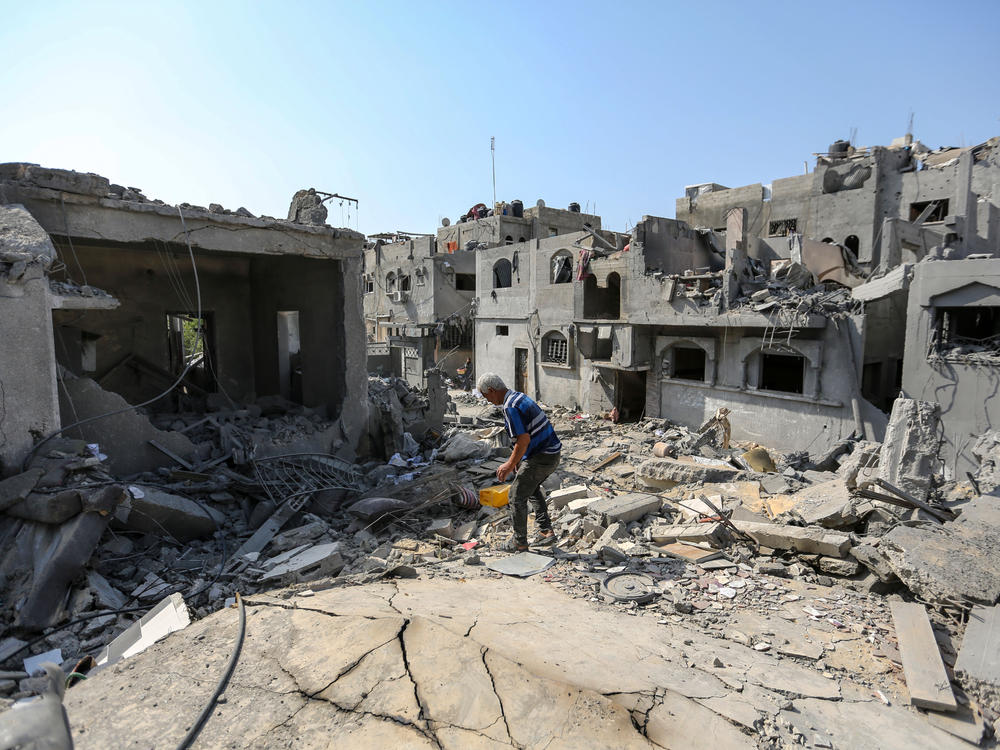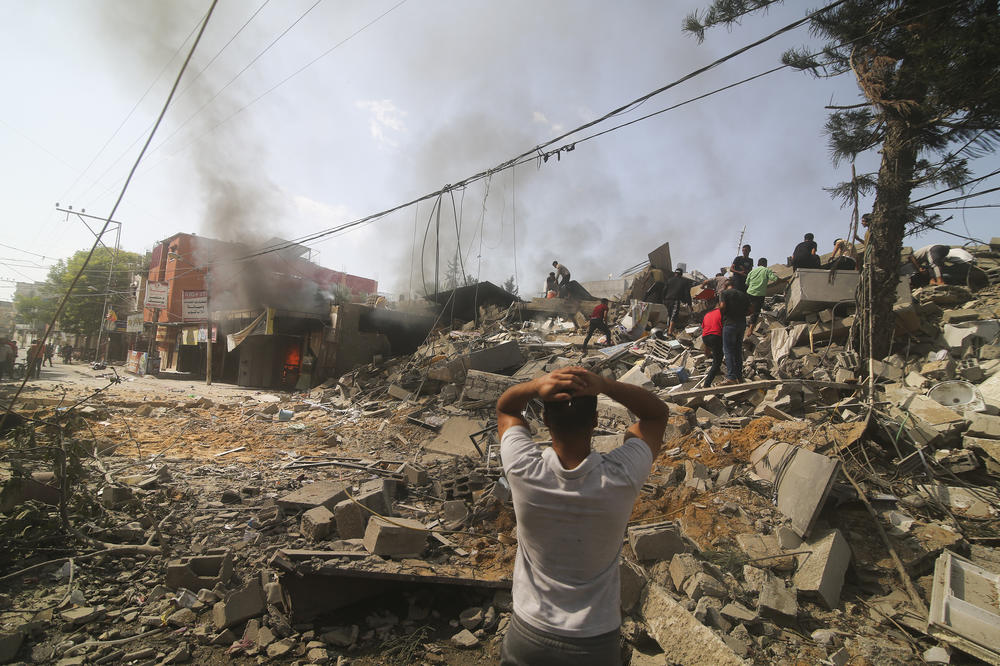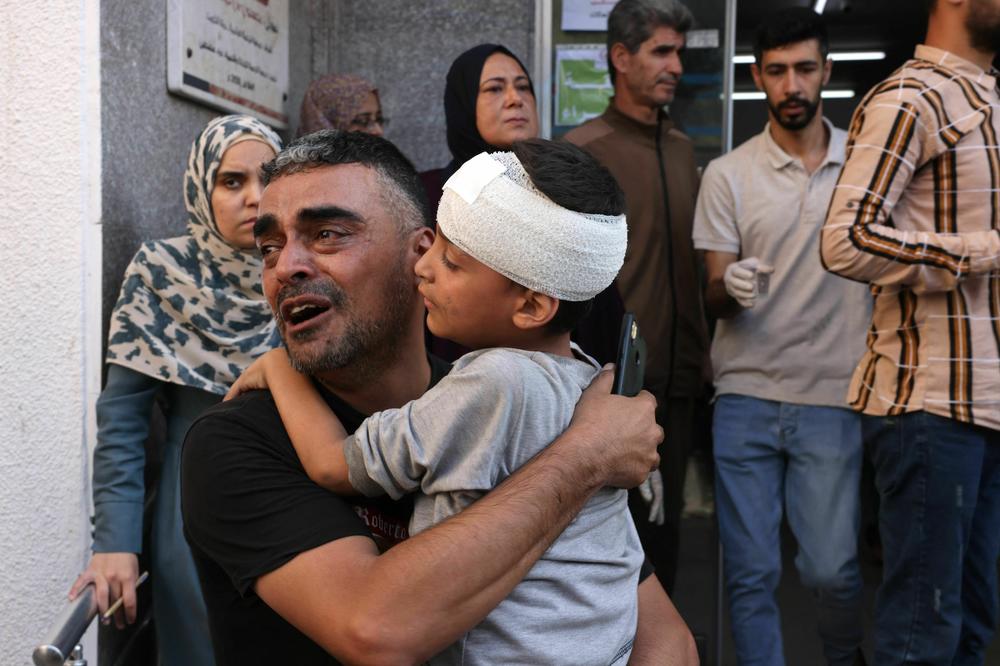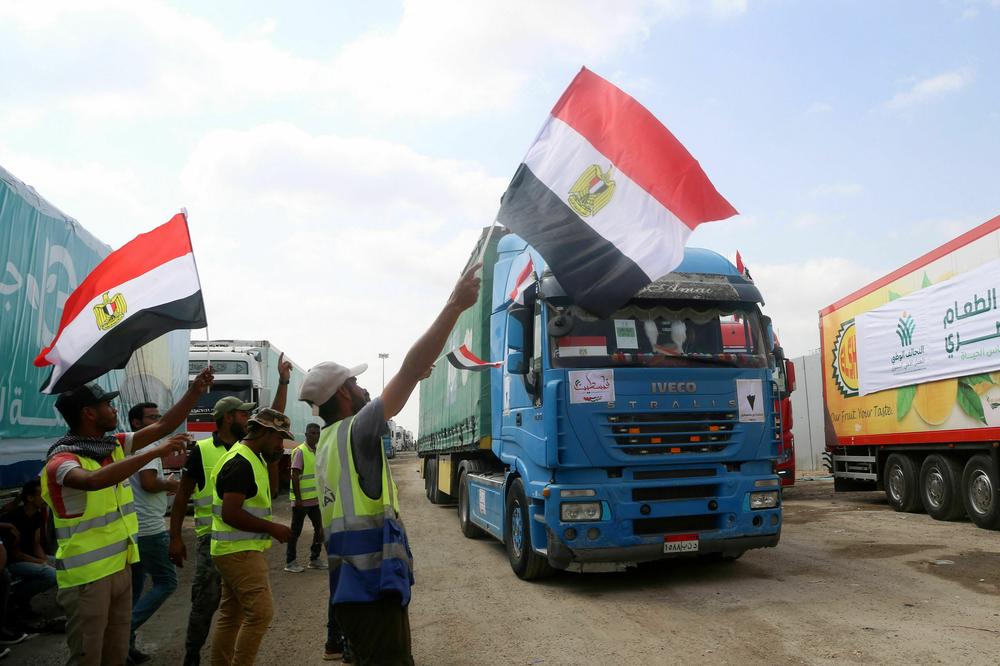Section Branding
Header Content
2 more hostages held in Gaza are freed, while Gaza officials say death toll tops 5,000
Primary Content
Updated October 23, 2023 at 6:36 PM ET
The International Committee of the Red Cross said it has facilitated the release of two hostages held by Hamas in Gaza on Monday, amid a multinational effort to free the more than 200 people held captive in Gaza before Israel's expected ground invasion.
The Red Cross said the release took place Monday evening. The group did not provide further details on the conditions or health of the newly released hostages.
Israeli public broadcaster Kan named the released Israelis as Nurit Yitzhak Cooper and Yocheved Lifshitz — around 80 and 85 years old respectively. Their husbands are reportedly still being held in Gaza.
It's the second hostage release since militants invaded southern Israel and abducted them two and a half weeks ago. The first hostages to be released were Judith Raanan, 59, and Natalie Raanan, 17, a mother and daughter from Illinois. The pair were freed on Friday, the result of negotiations between the U.S., Israel, Hamas and Qatar.
Israel said 220 hostages are still held captive in Gaza.
The release on Monday followed a night of intensifying Israeli airstrikes in Gaza
The Israel Defense Forces said the military struck over 320 military targets on Sunday, with a focus on Hamas headquarters, tunnels and firing positions in Gaza.
The overnight airstrikes killed more than 200 people, including in Rafah and Khan Younis, two cities in the south of Gaza that are crowded full of Palestinians who have evacuated from the northern part of the territory at Israel's urging.
More than half of Gaza's population of some 2.2 million people has been displaced from their homes, according to the United Nations. According to Gaza's Ministry of Health, the Palestinian death toll from Israeli airstrikes has reached 5,087 since the start of the conflict.
Fighting outside Gaza has also escalated. Over the weekend, several Israeli towns near the Israel-Lebanon border were evacuated amid rocket exchanges and gunfire with the Iranian-backed militant group, Hezbollah. Israel has also increased its airstrikes in the West Bank — a rarity prior to the current conflict — in what it says is an effort to fight off Hamas.
A small, third round of aid entered Gaza on Monday
After an initial delivery of 20 truckloads worth of aid Saturday, another 14 followed on Sunday. An additional shipment of 20 trucks entered Monday, according to the Palestinian Red Crescent.
But humanitarian workers say the relief is not nearly enough. The shipment of 14 trucks amounts to about 3% of what would normally cross the border each day before the hostilities began, according to the U.N.
The trucks contain medicine and other medical supplies, along with food and water. But no fuel has been allowed to enter Gaza. For normal Palestinians, gasoline and diesel have become nearly impossible to obtain, limiting their mobility. Many families report that their only remaining fuel is what is left in their vehicle's tank.
With Gaza's main power plant still out of operation, fuel is also needed to power generators for critical infrastructure, including hospitals, desalination plants and wastewater treatment facilities.
An emergency supply of fuel held by the U.N.'s relief agency for Palestinians, known as UNRWA, will be exhausted within a few days, officials have warned.
"Without fuel, there will be no water, no functioning hospitals and bakeries. Without fuel, aid will not reach those in desperate need. Without fuel, there will be no humanitarian assistance," said Philippe Lazzarini, UNRWA's commissioner-general, in a statement issued Sunday. "Without fuel, we will fail the people of Gaza whose needs are growing by the hour, under our watch."
Virtually every medical specialty in Gaza has run out of supplies, said Dr. Ghassan Abu Sitta, a British Palestinian surgeon working at al-Shifa Hospital, Gaza's largest medical center.
An estimated 14,000 wounded "have consumed all of the supplies in the system, from the medication to the equipment to everything you can imagine is required to care for such traumatic injuries and such critically ill patients," he told NPR.
"Not only are the supplies consumed, but also the staff has been consumed," he added.
UNRWA said on Monday that 35 members of its staff have been killed in Gaza since Oct. 7. "Many were teachers in our schools," the agency said.
World leaders call for "stability" while affirming Israel's right to respond
President Biden has not called for a cease-fire in the conflict. Reporters asked him Monday whether the U.S. would support a cease-fire in exchange for release of hostages. "We should have those hostages released and then we can talk," he said.
A group of Western leaders issued a joint statement Sunday reiterating support for Israel's "right to defend itself against terrorism" while also calling for the country to adhere to humanitarian law, including the protection of civilians. More than 1,400 Israelis were killed in Hamas' Oct. 7 attacks.
The statement came after a phone call between Biden, Prime Minister Justin Trudeau of Canada, President Emmanuel Macron of France, Chancellor Olaf Scholz of Germany, Prime Minister Giorgia Meloni of Italy, and Prime Minister Rishi Sunak of the United Kingdom.
The leaders committed to coordinating with partners in the region to ensure aid reached those in Gaza, as well as "close diplomatic coordination, including with key partners in the region, to prevent the conflict from spreading, preserve stability in the Middle East, and work toward a political solution and durable peace," the statement reads.
The comments from Western leaders came after Biden held a call with Israeli Prime Minister Benjamin Netanyahu, during which the two agreed to a "continued flow" of aid into Gaza, the White House said.
The conversation was just one of dozens Netanyahu has had with world leaders in recent days. Dutch Prime Minister Mark Rutte visited Israel on Monday, while France's Macron is scheduled to visit Tuesday.
China's special envoy to the Middle East, Zhai Jun, was also in the region Monday. Russia's foreign minister, Sergei Lavrov, is also planning to head to the Middle East, but started with allies in Iran on Monday.
NPR's Emily Olson and Rachel Treisman contributed reporting.
Copyright 2023 NPR. To see more, visit https://www.npr.org.





